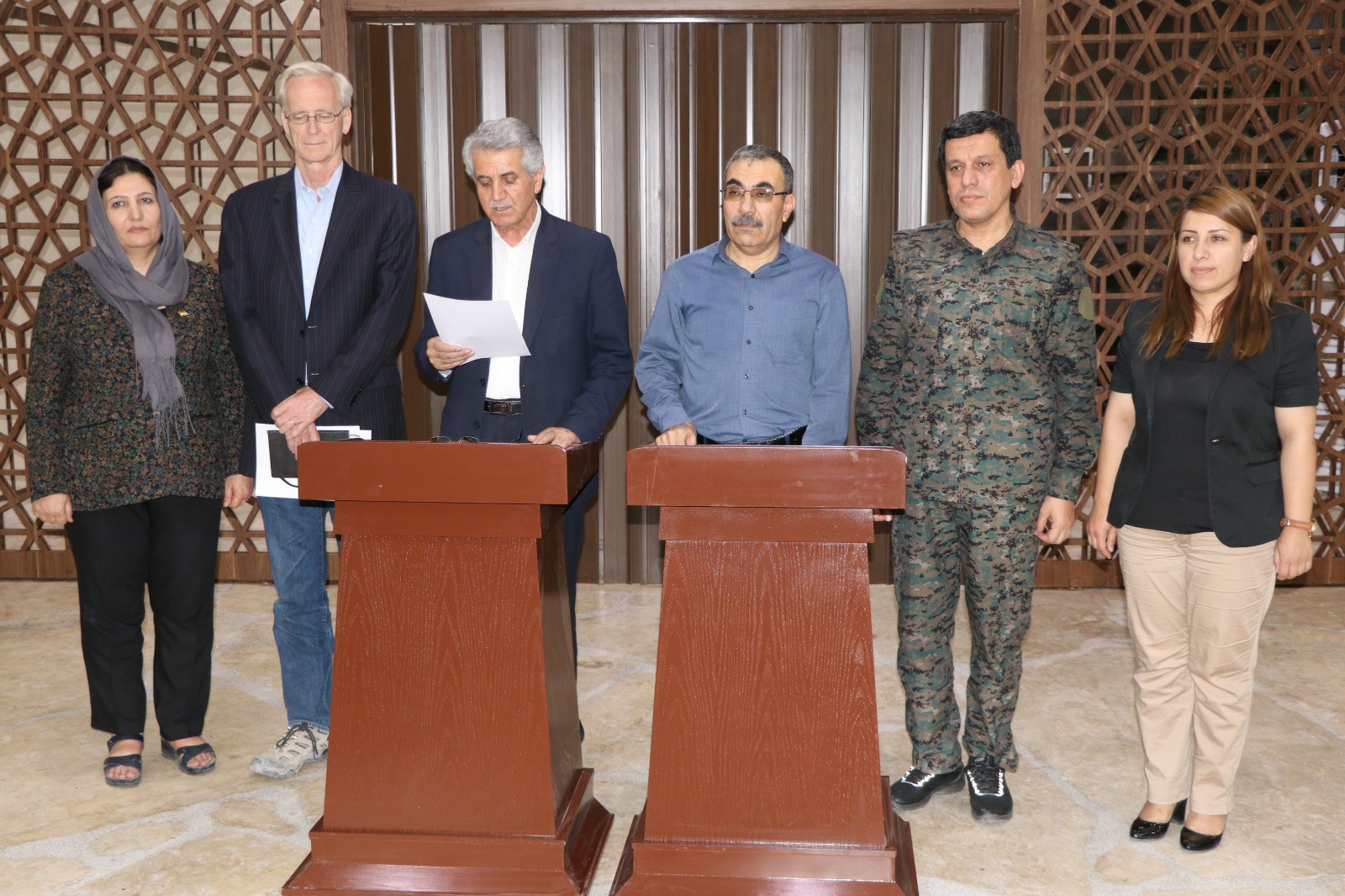Will excluding two parties be a stumbling block to Kurdish unity in Syria?
QAMISHLI, Syria (North Press) – Those familiar with the intra-Kurdish dialogue in Syria between the Kurdish National Unity Parties and the Kurdish National Council in Syria (ENKS) believe that the exclusion of the Kurdish Democratic Unity Party in Syria and the Kurdish Democratic Progressive Party in Syria has become a stumbling block to the declaration of the unified Kurdish position, especially in light of two excluded parties’ rejection of the dialogue’s mechanism.
The intra-Kurdish dialogue in Syria is proceeding at a slow pace, amid rounds and discussions described as “difficult” that have been going on for more than six months.
The dialogue, started with the initiative launched by SDF Commander-in-Chief Mazloum Abdi, is facing harsh criticism because of the exclusion of two Syrian Kurdish parties.
The two parties say that they were excluded from the dialogues in practice, despite denials of the SDF and the negotiating blocs.
However, with the increase in talk about adopting a quota mechanism by the two negotiating blocs within the unified Kurdish position that is about to be announced in the coming period, the positions of the two excluded parties appeared more firm.
This attitude coincided with a wave of criticism of the dialogue’s process and the exclusion of the two parties on social media and on the ground.
It is noteworthy that the Kurdish National Unity Parties are aligned with the Autonomous Administration of North and East Syria (AANES), while the ENKS is part of the opposition coalition.
So far, the two blocs have reached preliminary understandings about forming a unified position for the Kurds of Syria, where each bloc will have 40% representation.
The remaining 20% will be represented by independent figures and members of civil society organizations, according to the understanding.
However, information indicates that ENKS stipulated that each bloc should have the right to the remaining 10%.
20%… a balance point
This 20% represents the balance point in the future if it is for the other parties, as each bloc will work to ensure the earning of this percentage in favor of its political decisions.
“We demanded the 20% to be free, but ENKS refused,” said Ahmed Suleiman, member of the political bureau in the Kurdish Progressive Democratic Party in Syria.
“ENKS stipulated the power to expel the 10% members in the event that their decisions were violated within the unified position. The two blocs have not reached a state of trust yet,” Suleiman added.
In his interview with North Press, Suleiman said that they suggested forming a small committee of representatives of “the influential parties” to be a nucleus for establishing a unified position under the auspices of the SDF and the US, “but ENKS refused.”
He added, “They wanted to join us within the National Unity Parties, but we refused as our political vision differs from theirs,” Suleiman added.
Muhyeddin Sheikh Ali, secretary of the Kurdish Democratic Unity Party in Syria, said, “The distribution of the representation by fifty-fifty and the issue of numbers that is discussed between the two blocs stems from the lack of trust between them.”
“This model is unfair to the Kurds of Syria, and it is similar to the model reached by the Patriotic Union of Kurdistan (PUK) and the Kurdistan Democratic Party (DKP) in Iraqi Kurdistan,” Sheikh Ali stressed.
“There are parties that do not share the same political vision of both blocs, and that there are academic and independent persons who must be represented in the unified position,” he added.
“We have our vision that differs from the vision of the Democratic Union Party (PYD) and ENKS,” he noted.
“The initial discussions between the two blocs revolved around old problems that we were not concerned with, but when the matter evolved to discuss a political vision for forming a unified position, then, we are concerned with the matter of course,” he added.
SDF leadership and State Department officials supported the idea of including both excluded parties in the dialogue, especially after the first phase – that is, after the two blocs dealt with their “special” problems, according to Sheikh Ali and Suleiman.
Although the two parties have so far been excluded from the dialogue, they show “their support for the dialogue between the Kurdish parties.”
On September 20 Mazloum Abdi denied the exclusion of any Kurdish political parties from the initiative of unifying Kurdish position.
“The initiative of unifying the Kurdish position is going on according to its national standards; we aim at sharing all Kurdish political parties in Syria in this initiative,” Abdi tweeted in Kurdish.
No time to waste
For his part, Shorash Darwish, a writer and politician who resides in Germany, said that the two blocs do not have time to waste in the ongoing dialogues for an integrated political process.
Darwish, who lives in Germany, said, “Time is the most important factor that must be focused on, as the hours of Syria’s Kurds are controlled by the US elections, so wasting time will favor the enemies of the Autonomous Administration,” Darwish said.

